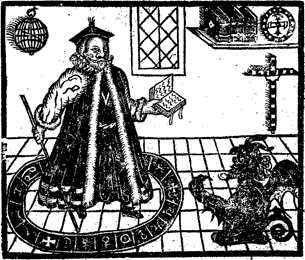|
|
|
|


Above our life we love a steadfast friend.
— Hero and Leander. l. 79.
Who ever loved, that loved not at first sight?
— Hero and Leander. l. 176.
Lone women, like to empty houses, perish.
— Hero and Leander. l. 242.
Honour is purchas'd by the deeds we do.
— Hero and Leander. l. 280.
Why, this is Hell, nor am I out of it.
Think'st thou that I, who saw the face of God
And tasted the eternal joys of heaven,
Am not tormented with ten thousand Hells
In being deprived of everlasting bliss?
— Doctor Faustus. Scene III.
Hell hath no limits, nor is circumscribed
In one self place; for where we are is Hell,
And where Hell is must we ever be.
— Doctor Faustus. Scene V.
And, to conclude, when all the world dissolves,
And every creature shall be purified,
All places shall be Hell that are not Heaven.
— Doctor Faustus. Scene V.
Was this the face that launched a thousand ships,
And burnt the topless towers of Ilium?
— Doctor Faustus.
Stand still, you ever-moving spheres of heaven,
That time may cease, and midnight never come.
— Doctor Faustus. Scene XIV.
Accursed be he that first invented war!
— Tamburlaine the Great, Part I. II. iv.
Virtue is the fount whence honour springs.
— Tamburlaine the Great, Part I. IV. iv.
Virtue solely is the sum of glory,
And fashions men with true nobility.
— Tamburlaine the Great, Part I. V. i.
A wound is nothing, be it ne'er so deep;
Blood is the god of war's rich livery.
— Tamburlaine the Great, Part II. III. ii.
There is no sin but ignorance.
— The Jew of Malta. Prologue.
Excess of wealth is cause of covetousness.
— The Jew of Malta. I.ii.
He that eats with the devil had need of a long spoon.
— The Jew of Malta. III. iv.
Love me little, love me long.
— The Jew of Malta. IV. vi.
The sight of London to my exiled eyes,
Is as Elysium to a new-come soul.
— Edward II. I. i.
What glory is there in a common good,
That hangs for every peasant to achieve?
That like I best that flies beyond my reach.
— The Massacre at Paris. I. ii.
Young oxen newly yoked are beaten more,
Than oxen which have drawn the plough before.
— Trans. of Ovid's Amores, Elegy II.
|
 | to Christopher Marlowe |
Site copyright ©1996-2010 Anniina Jokinen. All Rights Reserved.
Created by Anniina Jokinen on June 6, 2010.
|
|
The Tudors
King Henry VII
Elizabeth of York
King Henry VIII
Queen Catherine of Aragon
Queen Anne Boleyn
Queen Jane Seymour
Queen Anne of Cleves
Queen Catherine Howard
Queen Katherine Parr
King Edward VI
Lady Jane Grey
Queen Mary I
Queen Elizabeth I
Renaissance English Writers
Bishop John Fisher
William Tyndale
Sir Thomas More
John Heywood
Thomas Sackville
John Bale
Nicholas Udall
John Skelton
Sir Thomas Wyatt
Henry Howard
Hugh Latimer
Thomas Cranmer
Roger Ascham
Sir Thomas Hoby
John Foxe
George Gascoigne
John Lyly
Thomas Nashe
Sir Philip Sidney
Edmund Spenser
Richard Hooker
Robert Southwell
Robert Greene
George Peele
Thomas Kyd
Edward de Vere
Christopher Marlowe
Anthony Munday
Sir Walter Ralegh
Thomas Hariot
Thomas Campion
Mary Sidney Herbert
Sir John Davies
Samuel Daniel
Michael Drayton
Fulke Greville
Emilia Lanyer
William Shakespeare
Persons of Interest
Visit Encyclopedia
Historical Events
Field of the Cloth of Gold, 1520
Pilgrimage of Grace, 1536
The Babington Plot, 1586
The Spanish Armada, 1588
Elizabethan Theatre
See section
English Renaissance Drama
Images of London:
London in the time of Henry VII. MS. Roy. 16 F. ii.
London, 1510, the earliest view in print
Map of England from Saxton's Descriptio Angliae, 1579
Location Map of Elizabethan London
Plan of the Bankside, Southwark, in Shakespeare's time
Detail of Norden's Map of the Bankside, 1593
Bull and Bear Baiting Rings from the Agas Map (1569-1590, pub. 1631)
Sketch of the Swan Theatre, c. 1596
Westminster in the Seventeenth Century, by Hollar
Visscher's Panoramic View of London, 1616. COLOR
|
|